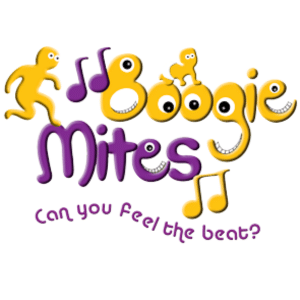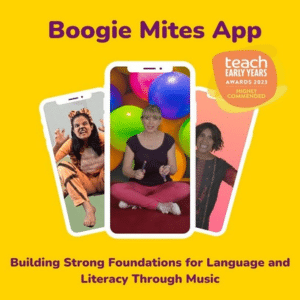Rhythm and Rhyme, Music and Movement: The Best Way to Boost Language and Literacy
Boogie Mites
22nd January 2024
Share this entry:
Boogie Mites are looking forward to co-presenting a workshop on this topic, with Michael Rosen at Childcare & Education Expo London on 2nd March 2024. Register for your free place here.
Research indicates that the ability to coordinate and time our movements may impact upon children’s ability to learn to read and write. Movement involves timing skills, developing rhythmic awareness, which is important in the processing of language sounds.
Rhymes are well known to help children’s language skills, but neuro-musical evidence suggests that there is much advantage to be gained from adding music and movement to rhythmic rhymes.
Nina Kraus, Brainvolts Auditory Laboratory Northwestern University, Illinois has found evidence that music and language skills and biologically linked. She says,
“Rhythm is an integral part of both music and language, and the rhythm of spoken language is a crucial cue to understanding. It may be that musical training—with its emphasis on rhythmic skills—can exercise the auditory-system, leading to less neural jitter and stronger sound-to-meaning associations that are so essential to learning to read.”
Let’s first consider rhymes, then adding music and movement with the benefits this brings for developing rhythmic awareness and the related benefits for memory and learning. 
Rhymes
Nursery rhymes are a valuable part of language development in early years, not least because of the regular repetition of these rhymes at home, toddler groups and nursery, providing the repetition required to develop the neural networks associated with language processing. Lullabies, nursery rhymes and traditional songs carry a special ‘signature’ of melodies and inflections which helps prepare babies’ ears, voices and brains for language. Regular opportunities to hear these songs and rhymes will support development of auditory processing skills and matching syllable beat patterns to language, all of which are known to support strong reading and writing skills.
A commonly known and quoted ‘fact’ about the importance if rhymes for literacy is “Experts in literacy and child development have discovered that if children know eight nursery rhymes by heart by the time they’re four years old, they’re usually among the best readers by the time they’re eight.” (Mem Fox 2001, Reading Magic). But maybe this has actually had a negative impact on music in early years settings, because they believe they are maximising potential benefits of music provision through use of traditional rhymes. This is not the full picture, as more recent studies have revealed that music and movement have a valuable part to play in developing early literacy skills. Adding recorded music, singing, keeping the beat and dance to rhyme time gives us an even more powerful development tool.
Rhythmic Awareness
Encouraging children to move in time to music helps them develop a sense of rhythm. This rhythmic awareness further consolidates the learning of the patterns and order of language sounds. Music encourages movement, and together they stimulate the brain connections between the auditory, visual and motor cortices, assisting the learning process. Timing is an important aspect of learning to read – an awareness of sound segments requires the ability to anticipate breaks in language sounds. Adding movement to songs further reinforces the rhythms in language.
Music, Movement and Memory
Kinaesthetic learning – learning by doing – often helps to embed memory. Music is motoric – it incites us to move; children love to dance, stamp, march, skip, and bob up and down to musical sounds. When tasks become automatic – when we can almost undertake a physical task without thinking about what we’re doing – we use ‘muscle memory’. Young children need to develop muscle memory by learning to move, balance and perform fine and gross motor skills, without thinking. Musical activities help to forge memories. We remember songs easier than rhymes, and rhymes easier than non-rhyming text. Moving to music therefore has a double impact upon language learning.
Rhymes with music and movement together thereby increase the chances of supporting language and literacy development with learning being retained and recalled via muscle memory.
The Best Way To Boost Language and Literacy
As a bonus, music is an engaging and fun activity that does not become boring with repetition, providing all the benefits of repetition for developing strong neural pathways.
We always hear from our nurseries that children cheer when it’s Boogie Mites time! This can be understood from studies that find music activities activate the reward neural network. Researchers led by Ben Gold, in the lab of Robert Zatorre at McGill University, put 20 volunteers through a musical reward learning task.
“This study establishes music as a neurobiological reward capable of motivating learning, showing how an abstract stimulus can engage the brain’s reward system to potentially pleasurable effect and motivate us to listen again and again.”
And we know that children learn best when they’re happy. Music is a magical method for motivating learning. It is therefore an incredibly powerful tool for early years educators to use such multisensory methods of rhymes, music and movement to build early literacy foundations, and it is fun for all involved!
Boogie Mites Collaboration with Michael Rosen
Boogie Mites have recently completed a project writing songs and interpreting some of them through movement and dance for some poems and nonsense rhymes written by Michael Rosen and published in his recent books: Ready For Spaghetti and A Great Big Cuddle.
You can watch video clips of a few of these musical rhymes here.
Boogie Mites Core Music Programmes:
Boogie Mites music programmes provide everything you need to equip your team with the training and resources to boost your music provision in the setting and outside, for each age group, boosting movement, mood and cognitive development for all involved – staff and children.
Boogie Mites School Ready Music Programme (3-5 years)
https://www.boogiemites.co.uk/shop/school-ready-training-package/
Boogie Mites Minis Music Programme (2-3 years)
https://www.boogiemites.co.uk/shop/minis-music-training-package/
Boogie Mites Teenies Music Programme (crawlers to 2 years) https://www.boogiemites.co.uk/shop/teenies-music-training-package/
Come and chat the team at Childcare & Education Expo London 2024 or contact sue@boogiemites.co.uk for a video call to explore options for boosting listening, language and literacy through music provision at your settings.
We will be showcasing our recently launched Boogie Mite App: Building Strong Foundations For Language and literacy Through Music.
Why attend Childcare & Education Expo?
Join over 2,500 like-minded individuals from the early years & primary sector who are dedicated to improving their practice and their education settings.
Attend educational seminars and panel discussions to credit your CPD
Meet the experts to have your questions answered
Receive fantastic onsite offers and discounts
Experience expert-led informative hands-on workshops
Network with peers and industry players
Pick up hundreds of new products, resources, ideas and services
And most of all, enjoy a great day out with your colleagues




